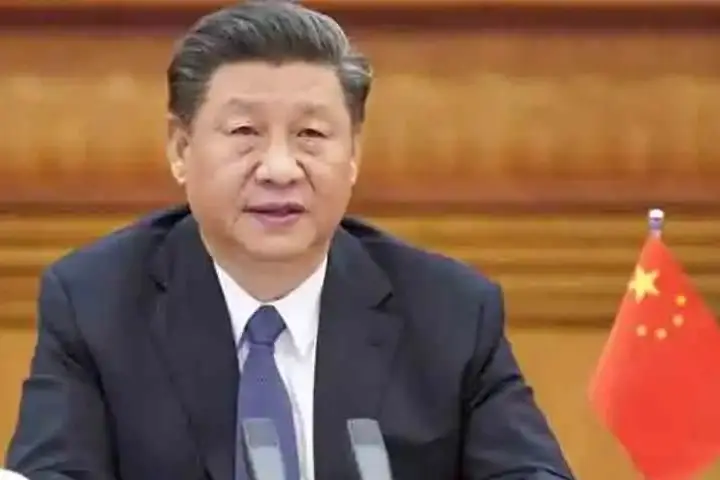

Chinese President Xi Jinping
<p>
Even as household debt in China grew at a steady pace&mdash;it rose from 51.5 per cent in January 2019 to touch 62 per cent at the end of the second quarter of this year, it had failed to rake up a storm.</p>
<p>
Though there has been a slight dip from the <a href="https://tradingeconomics.com/china/households-debt-to-gdp">62.2 per cent</a> recorded at the end of the second quarter in 2020, just when China was crawling out of the Covid 19 impact, household debt as a percentage of disposable income had reached a record high of 130.9 per cent by the end of last year.</p>
<p>
And now as the country stares at uncertainty after the Evergrande Group default, especially since real estate has been one of the most preferred savings instruments in China, analysts said that the level of disposable income with individuals would diminish and this may then dent overall consumption.</p>
<p>
<strong>Also read: <a href="https://www.indianarrative.com/economy-news/will-china-throw-a-lifeline-at-real-estate-icon-evergrande-to-prevent-a-larger-collapse-119653.html">Will China throw a lifeline at real estate icon Evergrande to prevent a larger collapse?</a></strong></p>
<p>
&ldquo;China&rsquo;s overall debt which includes household, corporate and government loans are at an alarmingly high level. This is even more concerning due to scarcity of data and information, so it is not easy to assess the real situation,&rdquo; Dk Srivastava, chief policy adviser, EY India told India Narrative.</p>
<p>
Srivastava said that the pandemic has only fuelled the situation.</p>
<p>
<strong>IMF warning on household debt </strong></p>
<p>
An <a href="https://blogs.imf.org/2017/10/03/rising-household-debt-what-it-means-for-growth-and-stability/">International Monetary Fund blog</a> in 2017 noted that &ldquo;rapid growth in household debt &ndash; especially mortgages &ndash; can be dangerous.&rdquo;</p>
<p>
&ldquo;In the short term, an increase in the ratio of household debt is likely to boost economic growth and employment, our study finds. But in three to five years, those effects are reversed; growth is slower than it would have been otherwise, and the odds of a financial crisis increase. These effects are stronger at the higher levels of debt typical of advanced economies, and weaker at lower levels prevailing in emerging markets,&rdquo; the blog notes.</p>
<p>
According to <a href="https://www.scmp.com/economy/china-economy/article/3144125/could-chinas-rising-household-debt-threaten-beijings-consumer">South China Morning Post</a>, debt is rising swiftly for a variety of reasons, but the trend is acute among upper middle class households who are borrowing to the hilt to invest especially in the post Covid 19 pandemic phase.</p>
<p>
<strong>Also read: <a href="https://www.indianarrative.com/economy-news/desperate-china-now-bans-sharing-of-bad-news-which-can-keep-foreign-investors-away-118897.html">Desperate China now bans sharing of bad news which can keep foreign investors away</a></strong></p>
<p>
&ldquo;Many owners of small and medium-sized enterprises (SMEs), who have not yet fully recovered from the pandemic, are taking out personal loans to keep businesses alive. Others are borrowing to make ends meet, often using new app-based loan services that make the process fast and easy,&rdquo; the news organisation said, adding that whatever be the reason, servicing loan payments is eating up disposal income &ldquo;that could otherwise be used to buy goods and services to support the economy.&rdquo;</p>
<p>
While an economist said that China has deep pockets to arrest the problem, &ldquo;debt denialism&rdquo; as Jing Daily, a digital publication on luxury consumer trends said could deal a big blow.</p>
<p>
<strong>Household debt situation in other countries </strong></p>
<p>
US, Japan, UK, Australia, are among the other countries besides China with huge household debt. While India&rsquo;s household debt to GDP ratio is still below 40 per cent and at a manageable level, the pandemic has led to its growth. &ldquo;As of now, there is no cause for alarm but these are unprecedented times and we need to remain watchful and cautious,&rdquo; an insider said.</p>
Family members of leading Baloch activist and Baloch Yakjehti Committee (BYC) leader, Sammi Deen Baloch…
Chile President Gabriel Boric, who is on a State visit to India, has expressed keen…
The French Embassy in India said on Monday that as France assumes the monthly presidency…
BNP-M President Sardar Akhtar Mengal said on Monday that his party's sit-in demanding the release…
Prime Minister Narendra Modi on Tuesday jointly addressed the press with Chile President Gabriel Boric…
INSV Tarini, part of the Navika Sagar Parikrama II expedition, arrived in Cape Town, South…